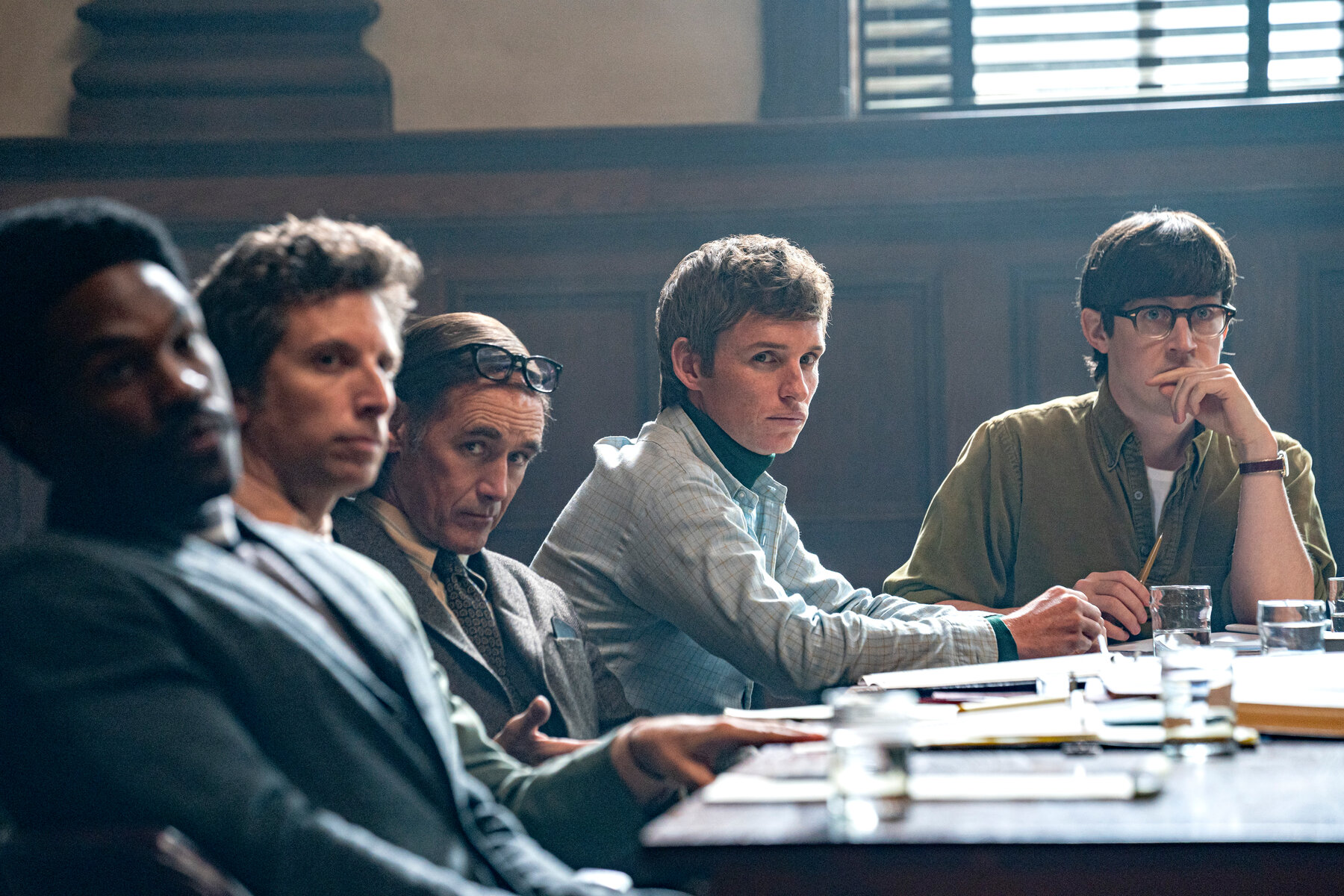by Eric Blume

We embrace respectful differences of opinion here at TFE, so with all due respect to my fellow staff writer Tony, who just gave Aaron Sorkin’s The Trial of the Chicago 7 a rave review, I offer a dissenting opinion. Fortunately thanks to Tony’s great synopsis, I can cut right to the chase. I love Aaron Sorkin as much as the next guy, thinking his scripts for both The Social Network and Steve Jobs are essentially masterpieces, and even thinking more favorably upon Molly’s Game than most: it had its own mini-sweep of energy and he tapped into all the things that make Jessica Chastain special.
But there’s not a frame of Sorkin’s new movie that felt authentic or assured to me...
I’ll break it up by the elements:
Design: The costuming and wig work on this movie feel like they’re out of an SNL skit. After the deep, simple work done in this area on the recent Mrs. America, where the actors looked so natural and effortless, the cast of Chicago 7 looks like they’re playing dress up, and like the makeup staff was too short-changed to give everyone enough time before "Action" was called.
Cinematography: After the film was over, I went to Wikipedia not to see who the cinematographer was, but to see if there was one. Let’s kindly say this is not Phedon Papamichael’s finest hour. His courtroom scenes look flat, out of a TV movie from the 80s, with no apparent specific visual take, and his exteriors have that weird Netflix brightness that’s an alarming trend. There just feels to be no overall conception of the film visually, just cameras and standard-issue lighting set up to capture the lines the actors are saying.

Writing: The script features some occasional Sorkin corkers, and of course there are all the present-day parallels that give Sorkin’s writing extra verve and purpose at the moment. But Sorkin has not developed any of the Seven titular characters. They’re all given one personality quirk, usually obvious and pandering, that helps us glob onto them. And it's not just the seven men on trial. The judge (played by Frank Langella) is written as a blustering old, cliched bureaucrat type (defenders will say “that was really what that guy was like!” to which I say that’s fine, but part of a film’s artistry would be to bring texture to that human, either in the writing, or if not, in the acting, but Sorkin has Langella playing one note on the piano in scene after scene). There’s no complexity in the themes of the film, either: our heroes are heroic, our bad guys are bad guys, and you’re told how to feel about every character and every situation at every moment.
Acting: While I’ve been reading articles about which of the actors will be getting an Oscar nomination, to me it’s more about which of the actors is the least terrible. Again, it’s not the actors’ fault: they’re trying their best in the tight confines of their roles. But are we really meant to laugh at/with Jeremy Strong? I get it! He’s a stoner! He’s stoned! That’s so funny! Except, really, it’s not. Surely Sorkin is above this kind of audience-baiting? You don’t feel like any of these characters live lives off the page …they all just exist to come in and say Sorkin’s lines. There’s no messiness or tattered ends to these characters. They’re one-note mouthpieces set in a vacuum, and there’s never a moment where the actors catch fire together. You yearn for moments where these fine actors go at each other, but those moments don’t come, or when they do, they fizzle. Essentially there's no conflict between the actors and no powerful unity either.

Directing and Editing: I can’t remember a film in recent memory by a major artist where every moment is more designed for audience response. In a more egregious example, Sorkin sets up a scene with John Carroll Lynch’s family, in which we learn his son is a Boy Scout, only to then have an excruciatingly amateur moment later where Lynch has a physical altercation in the courtroom so Sorkin can cut to his son witnessing it, in surely the most embarrassing tribute to The Bicycle Thief ever attempted. The courtroom scenes are edited to always land on the actor who is doing the most obvious thing that will tell the audience how to feel. Sorkin gives us no ambiguity here, no sense of a developing intricacy. We never have to feel anxious about the characters or the situations, because everything is delivered to us in such a facile package. Sorkin tips us off to when he’s being comic, cueing us to laugh, and even to when he’s being “subversive” (a scene where they go to visit Michael Keaton, which I think is supposed to be a cunning surprise but is set up so flatly, and then clarified so obviously, that it just lays there). Everything is telegraphed in advance, so you don’t have to think on your own.
Readers, please know I take less than zero joy in writing this review. Watching this movie made me mentally and physical depressed; it made me deeply sad. I couldn’t believe what I was watching, and kept trying to figure out what had gone wrong. Sorkin is one of our major talents and it's probably fair to say one of the best dramatic writers alive. It’s because of that that we hold him to the high standard he invites and merits, and unfortunately this is not a step forward for him. It was as if he didn’t trust his natural instincts and felt the need to deliver something overtly commercial, and in that effort, he lost his way. D+
Please sound off in the comments as always!